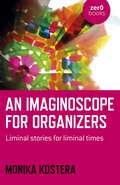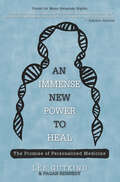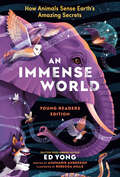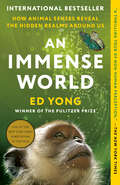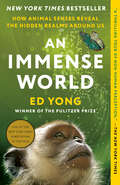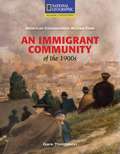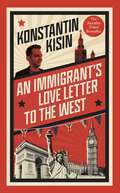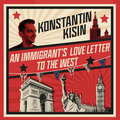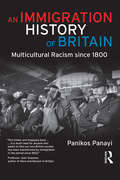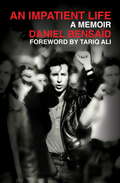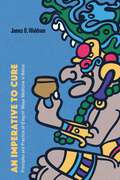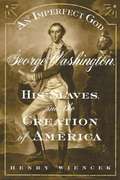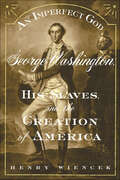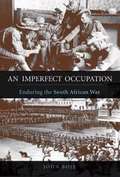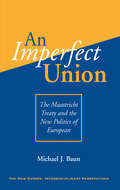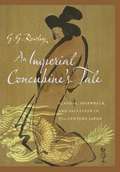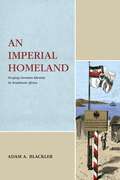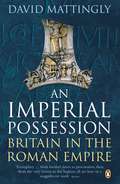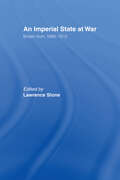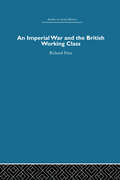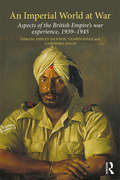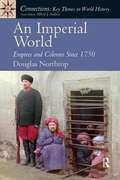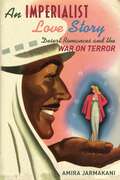- Table View
- List View
An Imaginoscope for Organizers: Liminal Stories for Liminal Times
by Monika KosteraAn Imaginoscope for Organizers offers practical exercises to use both individual and collective imagination to activate and mobilize creative organizing impulses. It proposes intellectual, symbolic and poetic food for thought and practice. Each chapter is a step on the quest for creative ideas and practices and introduces a language that can be used to invent and communicate your own.
An Immense New Power to Heal
by Lee Gutkind Pagan KennedyIs personalized medicine--what some scientists call genetic medicine--a pipe dream or a panacea? Francis Collins, current director of the National Institutes of Health and director of the Human Genome Project, considers this new era "the greatest revolution since Leonardo," while Nobel Laureate Leland Hartwell compares personalized medicine to a train that has not yet left the station--"a very slow train with a very long way to go . . . before we arrive at our destination."There is no denying that new technology, which has triggered an explosion of scientific information, is ushering in a revolution in medicine--for specialists, general practitioners and the public. Anyone can spit in a cup and, for a small fee, learn about his or her individual genetic make-up. But how useful is this information, really, to us or to our doctors? What's more, how much do we truly want to know--and have others know--about our possible destiny? There is more than we can imagine at stake.In An Immense New Power to Heal, authors Lee Gutkind and Pagan Kennedy delve into the personal side of personalized medicine and offer the physician's perspective and the patient's experience through intimate narratives and case studies. They also offer an intriguing background of the personalized medicine movement including the fascinating personalities of the key scientists involved as well as a glimpse into the in-fighting that accompanies any race for a scientific breakthrough. The result is a highly engaging, lively, and provocative discussion about this revolution in health care, and most importantly, what it really means for patients now and in the future.
An Immense World (Young Readers Edition): How Animals Sense Earth's Amazing Secrets
by Ed YongThe New York Times bestseller now available with beautiful full-color illustrations for young readers! Explore the amazing ways animals see, hear, and feel the world, with Pulitzer Prize winner Ed Yong.Did you know that there are turtles who can track the Earth's magnetic fields? That some fish use electricity to talk to each other? Or that giant squids evolved their enormous eyeballs to look out for whales?The world is so much BIGGER and more "immense" than we humans experience it. We can only see so many colors, we can only feel so many sensations, and there are some senses we can't access at all.Exploring the amazing ways animals perceive the world is an excellent way to help understand the world itself. And this young readers adaptation of the mega-bestseller An Immense World is perfect for curious kids and their families. Sure to capture young readers' interest it is filled amazing animal facts and stunning full-color illustrations. Along the way are tons of amazing animals facts: Did you know that leopard pee smells like popcorn? That there is a special kind of shrimp whose punches are faster than a bullet? That it's important to take your dog for dedicated "smell walks?" Want to know the real reason zebras have stripes? (hint: it's not for camouflage)? Pick up this enthralling and enormously entertaining book to find out!A Junior Library Guild Gold Standard Selection
An Immense World: How Animal Senses Reveal the Hidden Realms Around Us
by Ed YongEnter a new dimension—the world as it is truly perceived by other animals—from the Pulitzer Prize-winning, New York Times bestselling author of I Contain Multitudes.&“A stunning achievement, steeped in science but suffused with magic.&”—Siddhartha Mukherjee, author of The GeneThe Earth teems with sights and textures, sounds and vibrations, smells and tastes, electric and magnetic fields. But every kind of animal, including humans, is enclosed within its own unique sensory bubble, perceiving but a tiny sliver of our immense world. In An Immense World, author and Pulitzer Prize–winning science journalist Ed Yong coaxes us beyond the confines of our own senses, allowing us to perceive the skeins of scent, waves of electromagnetism, and pulses of pressure that surround us. We encounter beetles that are drawn to fires, turtles that can track the Earth&’s magnetic fields, fish that fill rivers with electrical messages, and even humans who wield sonar like bats. We discover that a crocodile&’s scaly face is as sensitive as a lover&’s fingertips, that the eyes of a giant squid evolved to see sparkling whales, that plants thrum with the inaudible songs of courting bugs, and that even simple scallops have complex vision. We learn what bees see in flowers, what songbirds hear in their tunes, and what dogs smell on the street. We listen to stories of pivotal discoveries in the field, while looking ahead at the many mysteries that remain unsolved. Funny, rigorous, and suffused with the joy of discovery, An Immense World takes us on what Marcel Proust called &“the only true voyage . . . not to visit strange lands, but to possess other eyes.&”
An Immense World: How Animal Senses Reveal the Hidden Realms Around Us
by Ed YongNEW YORK TIMES BESTSELLER <P><P> A “thrilling” (The New York Times), “dazzling” (The Wall Street Journal) tour of the radically different ways that animals perceive the world that will fill you with wonder and forever alter your perspective, by Pulitzer Prize–winning science journalist Ed Yong. <BR> “One of this year’s finest works of narrative nonfiction.”—Oprah Daily <BR> ONE OF THE TEN BEST BOOKS OF THE YEAR: The Wall Street Journal, The New York Times, Time, People, The Philadelphia Inquirer, Slate, Reader’s Digest, Chicago Public Library, Outside, Publishers Weekly, BookPage <BR> ONE OF THE BEST BOOKS OF THE YEAR: Oprah Daily, The New Yorker, The Washington Post, The Guardian, The Economist, Smithsonian Magazine, Prospect (UK), Globe & Mail, Esquire, Mental Floss, Marginalian, She Reads, Kirkus Reviews, Library Journal <BR> A KIRKUS REVIEWS BEST NONFICTION BOOK OF THE CENTURY <P><P> The Earth teems with sights and textures, sounds and vibrations, smells and tastes, electric and magnetic fields. But every kind of animal, including humans, is enclosed within its own unique sensory bubble, perceiving but a tiny sliver of our immense world. In An Immense World, Ed Yong coaxes us beyond the confines of our own senses, allowing us to perceive the skeins of scent, waves of electromagnetism, and pulses of pressure that surround us. We encounter beetles that are drawn to fires, turtles that can track the Earth’s magnetic fields, fish that fill rivers with electrical messages, and even humans who wield sonar like bats. We discover that a crocodile’s scaly face is as sensitive as a lover’s fingertips, that the eyes of a giant squid evolved to see sparkling whales, that plants thrum with the inaudible songs of courting bugs, and that even simple scallops have complex vision. We learn what bees see in flowers, what songbirds hear in their tunes, and what dogs smell on the street. We listen to stories of pivotal discoveries in the field, while looking ahead at the many mysteries that remain unsolved. <P><P> Funny, rigorous, and suffused with the joy of discovery, An Immense World takes us on what Marcel Proust called “the only true voyage . . . not to visit strange lands, but to possess other eyes.” <P><P> WINNER OF THE ANDREW CARNEGIE MEDAL • FINALIST FOR THE KIRKUS PRIZE • FINALIST FOR THE NATIONAL BOOK CRITICS CIRCLE AWARD • LONGLISTED FOR THE PEN/E.O. WILSON AWARD
An Immigrant Community of the 1900s
by Gare ThompsonDuring the 1880s, immigrants, people from all over the world, began to come to the United States.
An Immigrant's Love Letter to the West
by Konstantin KisinFor all of the West's failings - terrible food, cold weather, and questionable politicians with funny hair to name a few - it has its upsides. Konstantin would know. Growing up in the Soviet Union, he experienced first-hand the horrors of a socialist paradise gone wrong, having lived in extreme poverty with little access to even the most basic of necessities. It wasn't until he moved to the UK that Kisin found himself thriving in an open and tolerant society, receiving countless opportunities he would never have had otherwise.Funny, provocative and unswervingly perceptive, An Immigrant's Love letter to the West interrogates the developing sense of self-loathing the Western sphere has adopted and offers an alternative perspective. Exploring race politics, free speech, immigration and more, Kisin argues that wrongdoing and guilt need not pervade how we feel about the West - and Britain - today, and that despite all its ups and downs, it remains one of the best places to live in the world.After all, if an immigrant can't publicly profess their appreciation for this country, who can?
An Immigrant's Love Letter to the West
by Konstantin KisinFor all of the West's failings - terrible food, cold weather, and questionable politicians with funny hair to name a few - it has its upsides. Konstantin would know. Growing up in the Soviet Union, he experienced first-hand the horrors of a socialist paradise gone wrong, having lived in extreme poverty with little access to even the most basic of necessities. It wasn't until he moved to the UK that Kisin found himself thriving in an open and tolerant society, receiving countless opportunities he would never have had otherwise.Funny, provocative and unswervingly perceptive, An Immigrant's Love letter to the West interrogates the developing sense of self-loathing the Western sphere has adopted and offers an alternative perspective. Exploring race politics, free speech, immigration and more, Kisin argues that wrongdoing and guilt need not pervade how we feel about the West - and Britain - today, and that despite all its ups and downs, it remains one of the best places to live in the world.After all, if an immigrant can't publicly profess their appreciation for this country, who can?
An Immigrant's Love Letter to the West (Karen Pirie #4)
by Konstantin KisinTHE SUNDAY TIMES BESTSELLER'A lively and spirited book' DOUGLAS MURRAY'A paean to the freedom and dignity that many in the West take for granted' PETER BOGHOSSIAN'A cool, steady but urgent message that we should value and protect what we have' SPIKED'Kisin's book [has] a powerful moral quality that makes it worth reading' SUNDAY TIMESFor all of the West's failings - terrible food, cold weather, and questionable politicians with funny hair to name a few - it has its upsides. Konstantin would know. Growing up in the Soviet Union, he experienced first-hand the horrors of a socialist paradise gone wrong, having lived in extreme poverty with little access to even the most basic of necessities. It wasn't until he moved to the UK that Kisin found himself thriving in an open and tolerant society, receiving countless opportunities he would never have had otherwise.Funny, provocative and unswervingly perceptive, An Immigrant's Love letter to the West interrogates the developing sense of self-loathing the Western sphere has adopted and offers an alternative perspective. Exploring race politics, free speech, immigration and more, Kisin argues that wrongdoing and guilt need not pervade how we feel about the West - and Britain - today, and that despite all its ups and downs, it remains one of the best places to live in the world.After all, if an immigrant can't publicly profess their appreciation for this country, who can?
An Immigration History of Britain: Multicultural Racism since 1800
by Panikos PanayiImmigration, ethnicity, multiculturalism and racism have become part of daily discourse in Britain in recent decades – yet, far from being new, these phenomena have characterised British life since the 19th century. While the numbers of immigrants increased after the Second World War, groups such as the Irish, Germans and East European Jews have been arriving, settling and impacting on British society from the Victorian period onwards. In this comprehensive and fascinating account, Panikos Panayi examines immigration as an ongoing process in which ethnic communities evolve as individuals choose whether to retain their ethnic identities and customs or to integrate and assimilate into wider British norms. Consequently, he tackles the contradictions in the history of immigration over the past two centuries: migration versus government control; migrant poverty versus social mobility; ethnic identity versus increasing Anglicisation; and, above all, racism versus multiculturalism. Providing an important historical context to contemporary debates, and taking into account the complexity and variety of individual experiences over time, this book demonstrates that no simple approach or theory can summarise the migrant experience in Britain.
An Impatient Life
by Tariq Ali Daniel BensaidIn the classic tradition of the philosopher-activist, Daniel Bensaid tells the story of a life deeply entwined with the history of both the French and the international Left. From his family bistro in a staunchly red neighborhood of Toulouse to the founding of the Jeunesses communistes revolutionnaires in the 1960s, from the joyous explosion of May 1968 to the painful experience of defeat in Latin America, from the re-reading of Marx to the "Marrano" trail, Bensaid relates a life of ideological and practical struggle in which he unflinchingly sought to understand capitalism without ever succumbing to its temptations.
An Imperative to Cure: Principles and Practice of Q'eqchi' Maya Medicine in Belize
by James B. WaldramJames B. Waldram&’s groundbreaking study, An Imperative to Cure: Principles and Practice of Q&’eqchi&’ Maya Medicine in Belize, explores how our understanding of Indigenous therapeutics changes if we view them as forms of &“medicine&” instead of &“healing.&” Bringing an innovative methodological approach based on fifteen years of ethnographic research, Waldram argues that Q&’eqchi&’ medical practitioners access an extensive body of empirical knowledge and personal clinical experience to diagnose, treat, and cure patients according to a coherent ontology and set of therapeutic principles. Not content to leave the elements of Q&’eqchi&’ cosmovision to the realm of the imaginary and beyond human reach, Q&’eqchi&’ practitioners conceptualize the world as essentially material and meta/material, consisting of complex but knowable forces that impact health and well-being in real and meaningful ways—forces with which Q&’eqchi&’ practitioners must engage to cure their patients.
An Imperfect God: George Washington, His Slaves, and the Creation of America
by Henry WiencekWhen George Washington wrote his will, he made the startling decision to set his slaves free; earlier he had said that holding slaves was his "only unavoidable subject of regret."
An Imperfect God: George Washington, His Slaves, and the Creation of America
by Henry WiencekAn Imperfect God is a major new biography of Washington, and the first to explore his engagement with American slaveryWhen George Washington wrote his will, he made the startling decision to set his slaves free; earlier he had said that holding slaves was his "only unavoidable subject of regret." In this groundbreaking work, Henry Wiencek explores the founding father's engagement with slavery at every stage of his life--as a Virginia planter, soldier, politician, president and statesman. Washington was born and raised among blacks and mixed-race people; he and his wife had blood ties to the slave community. Yet as a young man he bought and sold slaves without scruple, even raffled off children to collect debts (an incident ignored by earlier biographers). Then, on the Revolutionary battlefields where he commanded both black and white troops, Washington's attitudes began to change. He and the other framers enshrined slavery in the Constitution, but, Wiencek shows, even before he became president Washington had begun to see the system's evil. Wiencek's revelatory narrative, based on a meticulous examination of private papers, court records, and the voluminous Washington archives, documents for the first time the moral transformation culminating in Washington's determination to emancipate his slaves. He acted too late to keep the new republic from perpetuating slavery, but his repentance was genuine. And it was perhaps related to the possibility--as the oral history of Mount Vernon's slave descendants has long asserted--that a slave named West Ford was the son of George and a woman named Venus; Wiencek has new evidence that this could indeed have been true.George Washington's heroic stature as Father of Our Country is not diminished in this superb, nuanced portrait: now we see Washington in full as a man of his time and ahead of his time.
An Imperfect Occupation: Enduring the South African War
by John BojeThe South African War (1899-1902), also called the Boer War and Anglo-Boer War, began as a conventional conflict. It escalated into a savage irregular war fought between the two Boer republics and a British imperial force that adopted a scorched-earth policy and used concentration camps to break the will of Afrikaner patriots and Boer guerrillas. In An Imperfect Occupation , John Boje delves into the agonizing choices faced by Winburg district residents during the British occupation. Afrikaner men fought or evaded combat or collaborated; Afrikaner women fled over the veld or submitted to life in the camps; and black Africans weighed the life or death consequences of taking sides. Boje's sensitive analysis showcases the motives, actions, and reactions of Boers and Africans alike as initial British accommodation gave way to ruthlessness. Challenging notions of Boer unity and homogeneity, Boje illustrates the precarious tightrope of resistance, neutrality, and collaboration walked by people on all sides. He also reveals how the repercussions of the war's transformative effect on Afrikaner identity plays out in today's South Africa. Readable and compassionate, An Imperfect Occupation provides a dramatic account of the often overlooked aspects of one of the first "modern" wars.
An Imperfect Union: The Maastricht Treaty And The New Politics Of European Integration
by Michael J BaunExploring the politics of European integration, Michael Baun argues that the end of the Cold War and German unification have created a new set of geopolitical realities in Europe that have profoundly affected the nature and dynamics of European union. His primary focus is the high politics" of European integration after 1989, especially the role of the Franco-German relationship in the Maastricht Treaty process.Acknowledging the important roots of the treaty in economic and institutional developments prior to 1989, Baun argues that Maastricht principally can be understood as a response by the EU and its member states to German unification and the end of the cold war. In making this argument, he departs from more conventional neofunctionalist or institutionalist interpretations of European integration.After providing the historical background of developments before 1989, Baun weighs the decision to launch parallel intergovernmental conferences on monetary and political union in 1990 and describes in detail the negotiations and treaty outcomes in each of these areas. He then examines the difficult ratification of the Maastricht treaty in 1992-1993, in the face of growing popular opposition and economic and monetary instability. The book concludes with an analysis of the future prospects for European union in the post-Maastricht era, as the EU approaches its next major intergovernmental conference in 1996.
An Imperial Concubine's Tale
by G. G. RowleyJapan in the early seventeenth century was a wild place. Serial killers stalked the streets of Kyoto at night, while noblemen and women mingled freely at the imperial palace, drinking saké and watching kabuki dancing in the presence of the emperor's principal consort. Among these noblewomen was an imperial concubine named Nakanoin Nakako, who in 1609 became embroiled in a sex scandal involving both courtiers and young women in the emperor's service. As punishment, Nakako was banished to an island in the Pacific Ocean, but she never reached her destination. Instead, she was shipwrecked and spent fourteen years in a remote village on the Izu Peninsula, before being set free in an amnesty. Returning to Kyoto, Nakako began a new adventure: she entered a convent and became a Buddhist nun.Recounting the remarkable story of this resilient woman and the war-torn world in which she lived, G. G. Rowley investigates aristocratic family archives, village storehouses, and the records of imperial convents to re-create Nakako's life from beginning to end. She follows the banished concubine as she endures rural exile, receives an unexpected reprieve, and rediscovers herself as the abbess of a nunnery. As she unravels Nakako's unusual tale, Rowley also profiles the little-known lives of samurai women who sacrificed themselves on the fringes of the great battles that brought an end to more than a century of civil war. Written with keen insight and genuine affection, An Imperial Concubine's Tale tells the true story of a woman's extraordinary life in seventeenth-century Japan.
An Imperial Concubine's Tale: Scandal, Shipwreck, and Salvation in Seventeenth-Century Japan
by G. G. RowleyJapan in the early seventeenth century was a wild place. Serial killers stalked the streets of Kyoto at night, while noblemen and women mingled freely at the imperial palace, drinking saké and watching kabuki dancing in the presence of the emperor's principal consort. Among these noblewomen was an imperial concubine named Nakanoin Nakako, who in 1609 became embroiled in a sex scandal involving both courtiers and young women in the emperor's service. As punishment, Nakako was banished to an island in the Pacific Ocean, but she never reached her destination. Instead, she was shipwrecked and spent fourteen years in a remote village on the Izu Peninsula before she was finally allowed to return to Kyoto. In 1641, Nakako began a new adventure: she entered a convent and became a Buddhist nun.Recounting the remarkable story of this resilient woman and her war-torn world, G. G. Rowley investigates aristocratic family archives, village storehouses, and the records of imperial convents. She follows the banished concubine as she endures rural exile, receives an unexpected reprieve, and rediscovers herself as the abbess of a nunnery. While unraveling Nakako's unusual tale, Rowley also reveals the little-known lives of samurai women who sacrificed themselves on the fringes of the great battles that brought an end to more than a century of civil war. Written with keen insight and genuine affection, An Imperial Concubine's Tale tells the true story of a woman's extraordinary life in seventeenth-century Japan.
An Imperial Homeland: Forging German Identity in Southwest Africa (Max Kade Research Institute)
by Adam A. BlacklerAt the turn of the twentieth century, depictions of the colonized world were prevalent throughout the German metropole. Tobacco advertisements catered to the erotic gaze of imperial enthusiasts with images of Ovaherero girls, and youth magazines allowed children to escape into “exotic domains” where their imaginations could wander freely. While racist beliefs framed such narratives, the abundance of colonial imaginaries nevertheless compelled German citizens and settlers to contemplate the world beyond Europe as a part of their daily lives.An Imperial Homeland reorients our understanding of the relationship between imperial Germany and its empire in Southwest Africa (present-day Namibia). Colonialism had an especially significant effect on shared interpretations of the Heimat (home/homeland) ideal, a historically elusive perception that conveyed among Germans a sense of place through national peculiarities and local landmarks. Focusing on colonial encounters that took place between 1842 and 1915, Adam A. Blackler reveals how Africans confronted foreign rule and altered German national identity. As Blackler shows, once the façade of imperial fantasy gave way to colonial reality, German metropolitans and white settlers increasingly sought to fortify their presence in Africa using juridical and physical acts of violence, culminating in the first genocide of the twentieth century.Grounded in extensive archival research, An Imperial Homeland enriches our understanding of German identity, allowing us to see how a distant colony with diverse ecologies, peoples, and social dynamics grew into an extension of German memory and tradition. It will be of interest to German Studies scholars, particularly those interested in colonial Africa.
An Imperial Possession: Britain in the Roman Empire, 54 BC - AD 409 (Penguin History of Britain)
by David MattinglyPart of the Penguin History of Britain series, An Imperial Possession is the first major narrative history of Roman Britain for a generation. David Mattingly draws on a wealth of new findings and knowledge to cut through the myths and misunderstandings that so commonly surround our beliefs about this period. From the rebellious chiefs and druids who led native British resistance, to the experiences of the Roman military leaders in this remote, dangerous outpost of Europe, this book explores the reality of life in occupied Britain within the context of the shifting fortunes of the Roman Empire.
An Imperial State at War: Britain From 1689-1815
by Lawrence StoneThe study of eighteenth century history has been transformed by the writings of John Brewer, and most recently, with The Sinews of Power, he challenged the central concepts of British history. Brewer argues that the power of the British state increased dramatically when it was forced to pay the costs of war in defence of her growing empire. In An Imperial State at War, edited by Lawrence Stone (himself no stranger to controversy), the leading historians of the eighteenth century put the Brewer thesis under the spotlight. Like the Sinews of Power itself, this is a major advance in the study of Britain's first empire.
An Imperial War and the British Working Class: Working-Class Attitudes and Reactions to the Boer War, 1899-1902
by Richard PriceFirst published in 2006. Routledge is an imprint of Taylor & Francis, an informa company.
An Imperial World at War: The British Empire, 1939–45
by Ashley Jackson Yasmin Khan Gajendra SinghAt the start of the Second World War, Britain was at the height of its imperial power, and it is no surprise that it drew upon the global resources of the Empire once war had been declared. Whilst this international aspect of Britain’s war effort has been well-studied in relation to the military contribution of individual dominions and colonies, relatively little has been written about the Empire as a whole. As such, An Imperial World at War makes an important contribution to the historiography relating to the British Empire and its wartime experience. It argues that the war needs to be viewed in imperial terms, that the role of forces drawn from the Empire is poorly understood and that the war's impact on colonial societies is barely grasped at all in conventional accounts. Through a series of case studies, the volume demonstrates the fundamental role played by the Empire in Britain’s war effort and highlights some of the consequences for both Britain and its imperial territories.Themes include the recruitment and utilization of military formations drawn from imperial territories, the experience of British forces stationed overseas, the use of strategic bases located in the colonies, British policy in the Middle East and the challenge posed by growing American power, the occupation of enemy colonies and the enemy occupation of British colonies, colonial civil defence measures, financial support for the war effort supplied by the Empire, and the commemoration of the war. The Afterword anticipates a new, decentred history of the war that properly acknowledges the role and importance of people and places throughout the colonial and semi-colonial world.’ This volume emanates from a conference organized as part of the ‘Home Fronts of the Empire – Commonwealth’ project. The project was generously funded by the Arts and Humanities Research Council and led by Yasmin Khan and Ashley Jackson with Gajendra Singh as Postdoctoral Research Assistant.
An Imperial World: Empires and Colonies Since 1750
by Douglas NorthropThis text helps students understand world history by focusing on an issue that has profoundly shaped the modern world order: the establishment and collapse of global empires since 1750. An Imperial World uses a combination of primary documents and analytical essays, both tightly focused around four case studies: India, Africa, Asia, and the Americas. It examines the historical development of colonial systems and shows their enormous role in shaping the modern world order. It is meant to be thematic and suggestive, offering arguments and information to serve as a starting point for discussion and exploration.
An Imperialist Love Story: Desert Romances and the War on Terror
by Amira JarmakaniA curious figure stalks the pages of a distinct subset of mass-market romance novels, aptly called “desert romances.” Animalistic yet sensitive, dark and attractive, the desert prince or sheikh emanates manliness and raw, sexual power. In the years since September 11, 2001, the sheikh character has steadily risen in popularity in romance novels, even while depictions of Arab masculinity as backward and violent in nature have dominated the cultural landscape. An Imperialist Love Story contributes to the broader conversation about the legacy of orientalist representations of Arabs in Western popular culture. Combining close readings of novels, discursive analysis of blogs and forums, and interviews with authors, Jarmakani explores popular investments in the war on terror by examining the collisions between fantasy and reality in desert romances. Focusing on issues of security, freedom, and liberal multiculturalism, she foregrounds the role that desire plays in contemporary formations of U.S. imperialism. Drawing on transnational feminist theory and cultural studies, An Imperialist Love Story offers a radical reinterpretation of the war on terror, demonstrating romance to be a powerful framework for understanding how it works, and how it perseveres.
